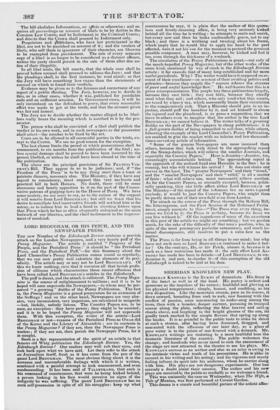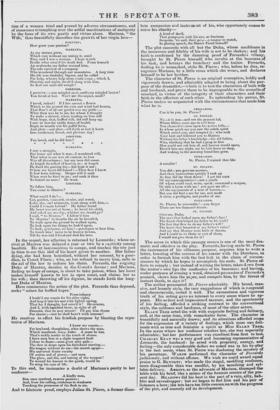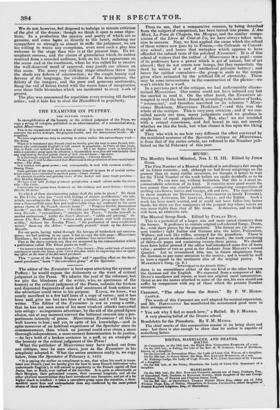SHERIDAN KNOWLES'S NEW PLAY.
SHERIDAN KNOWLES iS the BURNS of dramatists. His fancy is of the heart as well as of the head. His poetry is ardent and generous as the impulses of his nature; healthful and glowing as his physical temperament ; simple, honest, and confiding, as his own disposition. Like the mountain stream, pure as its source, it flows onward, bounding from rock to rock, now foaming with the conflict of passion, anon murmuring its under-song among the trees, then with a broader, deeper current, pursuing its tranquil course along the plain, reflecting the blue heaven and sailisg clouds above, and laughing in the bright glances of the sun, its goodly track marked by the simple flowers that spring up along the banks. It is as grateful to the public taste to slake its thirst at such a stream, after having been 'hammed, drugged, and nauseated with the effusions of our later day, as a glass of pure water is to the palate of one fevered with a debauch. Mr. KNOWLES'S writings are restoring to a more healthful tone the dramatic literature of the country. The public welcomes the change; and hundreds who never cared to seek the amusement of the stage are now attracted to the theatre to see his plays. Mr. KNOWLES'S success as an author-and-also as an actor is owing to the intrinsic virtue and truth of his perceptions. -He is alike in earnest in his writing and his,acting; and his vigorous and manly feeling infuses its spirit into his audience, whom he carries along with him. His plays arc not dangerous experiments. One has scarcely a doubt about their success. The author and his new plays are received bj the public as cordially as we welcome a friend. This was eminently the case on Wednesday, when The Tale of Mantua, was first performed at Covent Garden.
This drama is a simple and beautiful picture Of the ardent affee-; tion of a woman tried and proved' by adverse circumstances, and of innocence triumphing over the artful machinations of malignity by the force of its own purity and virtue .alone. Mariana, "the Wife," thus beautifully describes the growth of her virgin love-
LOREN2C.
How grew your passion?
MARIANA.
As my stature grew, Which rose without my.noting it, until They said I was a woman. I kept watch Beside what seeed his deathbed. From beneath An avalanche my father rescued him, The sole survivor of a company Who wandered through our mountains. A long time His life was doubtful, Signor, and he called For help, whence help alone could come ; which I, Morning and night, invok'd along with him. So first oursouls did mingle!
LORENZO.
I perceive :—you mingled soots until you mingled hearts? You loved at last. Was't not the sequel, maid?
MARIANA.
I loved, indeed ! If I but nursed a flower
Which to the ground the rain and wind had beaten, That flow'r of ground our garden was my pride:—
What then was he to me, for whom I thought To make a shroud, when, tending on him still With hope, that, baffled still, did still keep up, I saw at last the ruddy dawn of health Begin to mantle o'er his pallid form, Aud glow—and glow—till forth at last it burst Into confirmed, broad, and glorious day !
LORENZO.
You loved, and he did love? *
I saw a struggle,
But knew not what it was—I wondered still, That what to me was all content, to him Was all disturbance ; but my turn did come. At length he talked of leaving us ; at length He fixed ,the parting day—but kept it not : 0 how my heart did bound !—Then first I knew It had been sinking. Deeper still it sank When next he fixed to go; and sank it then To bound no more ! Ile went.
LORENZO.
To follow him, You came to Mantua?
MA RIANA.
What could I do?—
Cot, garden, vineyard, rivulet, and wood, Lake, sky, and mountain, went along with him,— Could I remain behind? My father found My heart was not at home ; he loved his child, And asked me one day, whither we should go?
I said, " to Mantua." I fifflow'd him To Mantua! to breathe the air he breath'd, To walk upon the ground he walked upon, To look upon the things he look'd upon, To look, perchance, on him !—perchance to hear him, To touch him ! never to be known to him, Till he was told I lived and died his love.
In the sequel, her affection is returned by Leonardo ; whose ar- rival at Mantua was delayed a year or two by a captivity among banditti. He at last contrives to escape, and reaches the city just in time to see this idol of his heart given to another. Her father dying, she had been betrothed, without her consent, by a guar- dian, to Count Florio ; who, on her refusal to marry him, calls in the aid of the law to enforce his claim. Ferrardo, the reigning Duke of Mantua, decides in the Count's favour; and Mariana, finding no hope of escape, is about to take poison, when her lover makes himself known to her in open court, and claims her as his wife ; then throwing off his diguise, he stands forth the long- lost Duke of Mantua.
Here commences the action of the plot. Ferrardo thus deposed, seeks " solace for baffled hopes."
From infancy • I loath'd my cousin for his elder right, And leap'd into his seat with lighter spring, That he, I thought, had miss'd it ! He returns, And I, with humbled brow, in sight of all •
Descend, that he may mount ! pay him shame For shame;—but he shall have't with'interest !
He resolves to effect his fiendish purpose by blasting the repu- tation of Mariana.
I know my cousin,— For boyhood, thoughtless, often shows the man, Which manhood, wary, hides. A sense he has, That's sickly tender to the touch of shame. I have seen him at a slight imputed fault Colour to flame—anon grow ashy pale— The dew in drops upon his forhehead starting,— His tongue without Its use—his mouth agape— His universal frame vacuity Of action and of power,—and anon The glare, and din, and tossing of the tempest ! To wound his honour to the quick, would be To sting his core of life.
To this end, he insinuates a doubt of Mariana's purity to her confessor—
A kindly man, But, once resolved, to error positive ; And, from his calling, credulous to weakness Touching the proneness of the flesh to sin.
And to fabricate proof, employs Julian St. Pierre, a former disso- lute companion and instrummt of his, who opportunely comes to crave his charity—
A kind of devil,
That grasps you with his eye, as fascinate Serpents, 'tie said, their prey—a tongue to match, In glosing speech, the Master Fiend himself!
The plot succeeds with all but the Duke, whose confidence in the innocence and fidelity of his wife is not to be shaken; and his faith is confirmed by the damning proof of Fermrdo's villany, brought by St. Pierre himself, who revolts at the baseness of his task, and betrays the treachery and the traitor. Ferrardo, finding he is unmasked, stabs St. Pierre; who, before he dies, re- cognizes Mariana, by a little cross which she wears, and declares himself to be her brother.
The character of St. Pierre is an original conception, boldly and vigorously drawn, and admirably adapted to bring about the pur- pose of the dramatist,—which is to test the characters of both wife and husband, and prove them to be impregnable to the assaultsof mischief, in virtue of the integrity of their characters and their faith in the affection of each other. In upbraiding his patron, St. Pierre makes us acquainted with the circumstances that made him what he is.
FERRARO°.
Can it be you, St. Pierre?
ST. PIERRE.
No—it is you—and not the peasant lad, Whom fifteen years ago in evil hour
You chanced to cross upon his native hills,— In whose quick eye you saw the subtle spirit Which suited you, and tempted it; who took Your hint and followed you to Mantua Without his father's knowledge—his old father, Who, thinking that he had a prop in him Man could not rob him of, and heaven would spare, Bless'd him one night, ere he laid down to sleep, And waking inthe morning found him gone.
FETtRARDO.
St. Pierre, I trained thee like A cavalier !
ST. PIERRE.
You did—you gave me masters, And their instructions quickly I took up As they did lay them down! I got the start Of my contemporaries!—not a youth Of whom could read, write, speak, command a weapon, - -
Or rule a horse with me ! you gave me all—
All the equipments of a man of honour,— But you did find a use for me, and made A slave, a profligate, and pander of me.
FERRARDO.
St. Pierre, be reasonable !—you forget There are ten thousand ducats.
ST. PIZRRE.
Give me, Duke,
The eyes that looked upon my father's face ! The hands that helped my father to his wish! The feet that flew to do my father's will ! The heart that bounded at nay father's voice! And say that Mantua were built of ducats, And I could be its Duke at cost of these, I would not give them for it !
The scene in which this passage occurs is one of the most dra- matic and effective in the play. Ferrardo, having made St. Pierre the instrument of his villanous purpose, requires him to write a letter, boasting of the success of his amour with the Dutchess, in order to furnish him with the last link in the chain of circum- stances by which he hopes to accomplish his ends. St. Pierre af- fects to comply ; but instead of writing the letter, takes down from the traitor's own lips the confession of his baseness; and having, under pretence of erasing a word, obtained possession of Ferrardo's poniard, shows him the paper, and compels him, by the threat of instant death; to sign it! The author personated St. Pierre admirably. His broad, mas- sive, and homely style, the very ruggedness of which is congenial and characteristic, suited it well. The earnestness and vigorous truth of his acting gave an interest to every scene where he ap- pears. His ardent and impassioned manner, and the spontaneity of his feeling, afforded a striking contrast to the conventional style, the coldness and hardness, of most of the other actors. ELLEN TREE acted the wife with exquisite feeling and delicacy, and, at the same time, with remarkable force. The character is beautifully and naturally drawn; and its situations afforded scope for the expression of a variety of feelings, which none can deli- neate with so true and feminine a spirit as Miss ELLEN TREE. In the scene where her confessor rebukes her, she was especially admirable; but her performance was excellent from first to last. CHARLES KEAN was a very good and becoming representative of Leonardo, the husband: he acted with propriety, energy, and feeling—the only considerable defect we noted was in his by-play in the last scene, when St. Pierre was disclosing the mystery of his parentage. WARD performed the character of Ferrardo judiciously, and without offence. We wish we.could award equal praise to G. BENNETT; who made the stupid, meddling confessor, more disagreeable than was needful, by his mouthing and syl- labic delivery. ABBOTT, as the advocate of Mariana, thumped the table with his brief, like a mimic of the forensic orators of the pre- sent day. MEADOWS did his best in the part of a vain, silly, bab- bler and eavesdropper: but we began to feel !lira and his pair of listeners a bore; the trio have too little connexion with the progress of the 'plot, and icarcely aid its development. We do not, however, feel disposed to indulge in minute criticism of the plot of the drama; though we think it open to some objec- tions. In a production the passion and poetry of which are so genuine, and come Nene so directly to the heart, enlisting our sympathies so strongly as almost to stifle the judgment, we are too willing to waive any exceptions, even were such a play less welcome to the stage than this is at the present time. Its tri- umphant success, and the cheers of gratulation which its author received from a crowded audience, both on his first appearance on the scene and at the conclusion, when he was called for to receive the well-deserved meed of approval, may justify our silence on this score. The many very striking stage-situations threw into the shade any defects of construction ; as the simple beauty and fervour of the language, the vividness of the descriptions, the felicity of the imagery, and the pure and generous sentiments, fluncrb the veil of fiction tinted with the warm hues of imagination over those little blemishes which are incidental to every work of genius.
The play was announced for repetition every evening till further notice; and it bids fair to rival the Hunchback in popularity.
























 Previous page
Previous page